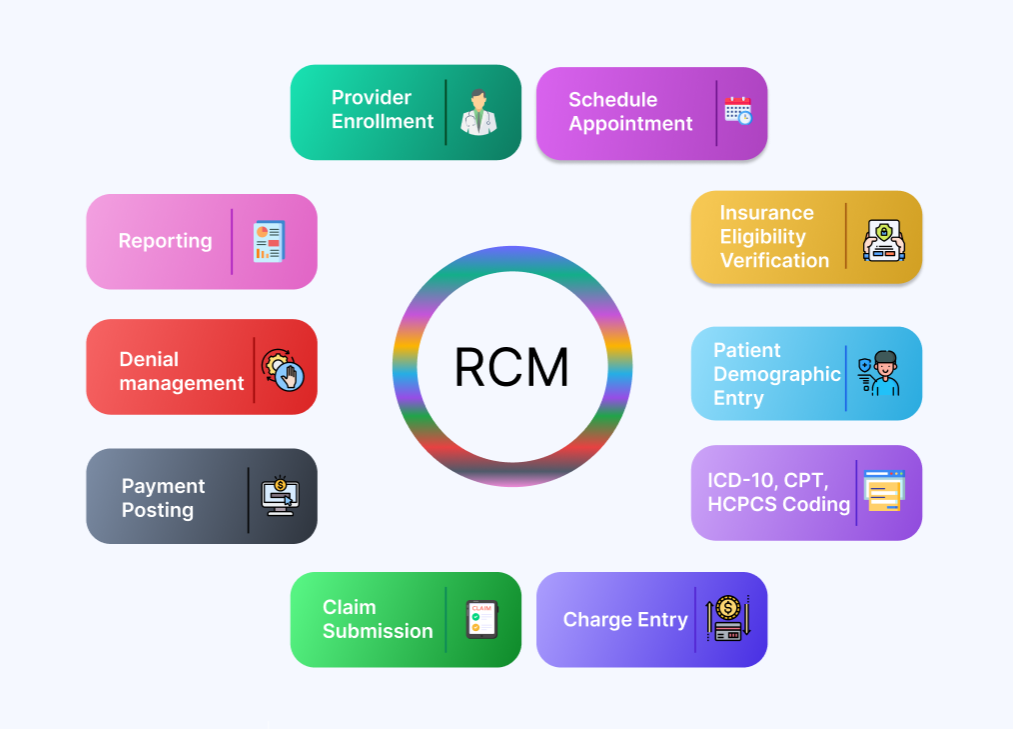
Revenue Cycle Management (RCM) is a term that frequently surfaces in discussions about healthcare administration and financial efficiency. Despite its pivotal role in the healthcare industry, RCM often remains an abstract concept to those outside the field. To demystify it, let's delve into what Revenue Cycle Management truly entails, its importance, and the innovative trends shaping its future.
What is Revenue Cycle Management?
At its core, Revenue Cycle Management is the process of managing the financial transactions and processes associated with patient care from the initial point of contact to the final payment of the healthcare service provided. It encompasses the entire lifespan of a patient account, beginning with scheduling an appointment and concluding with the successful collection of all payments.
The Stages of Revenue Cycle Management
- Pre-Authorization and Scheduling:
- The journey begins when a patient schedules an appointment. At this stage, verification of insurance coverage and pre-authorization for certain procedures are crucial to ensure that services will be covered and paid for by insurers.
- Patient Registration:
- Accurate collection of patient information, including demographics, insurance details, and medical history, is essential. This data forms the foundation for the subsequent billing processes.
- Charge Capture:
- As services are provided, every chargeable action (from a doctor’s consultation to a diagnostic test) is recorded. This step involves meticulous documentation to ensure all billable services are captured accurately.
- Claim Submission:
- Once charges are recorded, claims are prepared and submitted to insurance companies. This involves converting services provided into standardized codes (such as ICD-10 or CPT codes) and ensuring the claim is compliant with payer requirements.
- Payment Posting:
- Payments from insurers and patients are received and recorded. This stage also includes identifying and reconciling discrepancies between expected and actual payments.
- Denial Management:
- Not all claims are paid on first submission. Effective RCM involves identifying denied or underpaid claims, understanding the reasons behind them, and taking corrective actions to resubmit or appeal.
- Patient Billing and Collections:
- After insurance payments, any remaining balances are billed to patients. This stage requires sensitivity and efficiency to manage collections while maintaining positive patient relations.
Why is Revenue Cycle Management Important?
RCM is critical for the financial health of healthcare providers. Efficient RCM ensures that healthcare providers are compensated for their services promptly and accurately, reducing the financial strain and enabling them to focus more on patient care rather than financial survival.
Innovative Trends in Revenue Cycle Management
- Artificial Intelligence (AI) and Machine Learning:
- AI and machine learning algorithms are revolutionizing RCM by automating routine tasks, predicting denials, and optimizing claims processing. These technologies enhance accuracy, reduce human error, and speed up the revenue cycle.
- Blockchain Technology:
- Blockchain’s secure and transparent nature offers promising solutions for data exchange and fraud prevention in RCM. It can streamline verification processes and enhance data integrity, ultimately improving the reliability of financial transactions.
- Patient Engagement Solutions:
- Modern RCM increasingly involves patient-facing technologies like mobile payment options, online portals for billing inquiries, and real-time insurance verification tools. These innovations improve patient satisfaction and ensure a smoother billing experience.
- Data Analytics:
- Advanced data analytics provide deeper insights into revenue cycle performance. By analyzing trends and identifying bottlenecks, healthcare providers can implement targeted improvements and strategic adjustments to optimize financial outcomes.
The Future of Revenue Cycle Management
As the healthcare industry evolves, so too does RCM. The integration of advanced technologies, a greater focus on patient-centric approaches, and ongoing regulatory changes will continue to shape the landscape. Healthcare providers who stay ahead by adopting innovative RCM practices will be better positioned to navigate the complexities of modern healthcare finance.
Revenue Cycle Management is much more than a back-office function; it is the backbone of financial stability in healthcare. Understanding and optimizing RCM processes are vital for ensuring that healthcare providers can continue to deliver high-quality care while maintaining financial viability. As technology and patient expectations evolve, so will the strategies and tools employed in RCM, making it an exciting field poised for continual growth and improvement.
